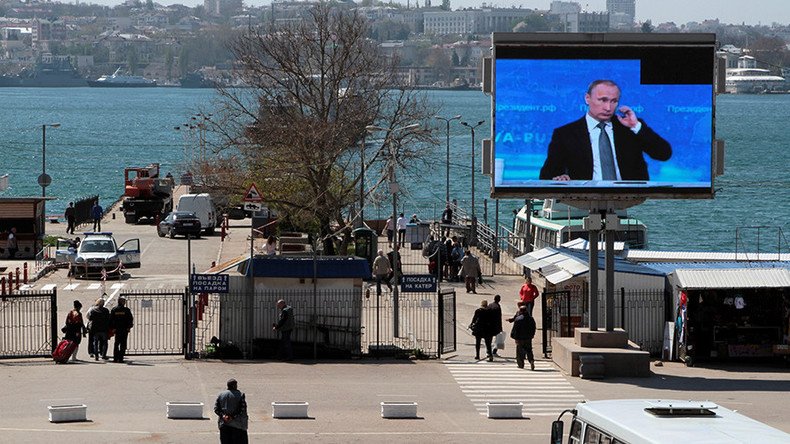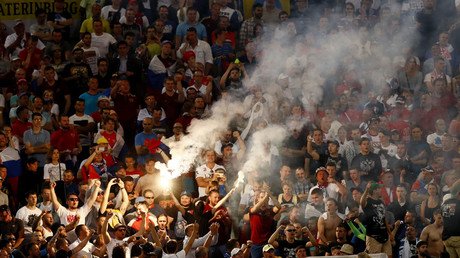Are Russian lives 'tough and thankless,' as the Guardian says?

The house journal of Britain's liberal elite believes Russian lives are "tough and thankless." It's another example of the dreadful quality of English-language coverage of this country.
Correspondents for Western media outlets in Moscow are known as the “hack pack.” And the term could be considered pejorative if they hadn't christened themselves with it. Very few are qualified or properly trained journalists, and most of them wouldn’t survive five minutes in a proper British or American newsroom. Not only because they’d no longer be able to blame every negative, calamity, hardship, tribulation or rain shower on ‘the Kremlin.’
That said, the quandary is far from universal, and there are some very talented foreign journalists in Moscow. But, frequently, their best efforts are spoiled by overzealous editors back home, who rigidly stick to the editorial line on "Putin's Russia."
Surely, this is the only explanation for how the Guardian - a rabidly anti-Russian British newspaper - ended up captioning a report from Irkutsk last week with mind-bogglingly offensive text? Because the 'rag' told us Russian lives are “tough and thankless.” The hypothesis appears to have been based on a short video clip, featuring one of the better writers on this beat.
Different interpretations
Let’s be clear here, in post-Soviet Russia, some cities and regions have flourished, and others have languished. For instance, you couldn’t venture to Tyumen, Krasnodar or Vladivostok and not be impressed by the scale of the improvements. However, a lot of places are standing still, or getting worse. And this is particularly problematic in eastern Siberia and the Far East, where remote geography leads to high prices and a lack of inward investment. Furthermore, the harsh climatic conditions lend themselves to exaggerated gloom. Thus, presenting a perfect backdrop to portray hardship.
Nevertheless, to suggest folk are enduring “tough and thankless” lives is extraordinarily obnoxious. And you can only imagine the Guardian’s outrage if a Russian newspaper ventured to bleak British northern outposts like Blackpool, Sunderland or Oldham and used the same language to describe their inhabitants? It'd be akin to the Olympics for offended, scandalized and infuriated liberal commentators.
Yet, as it happens, London has far less of an excuse for its failure to tackle post-industrial decline than Moscow. The United Kingdom didn’t suffer what Russia endured in the 1980’s and 1990’s when the entire economic and governmental system collapsed. Also, by comparison to the world's largest nation, England is a tiny country where residents of hollowed-out towns can commute to alternative employment centers. Correlatively, in the case of Irkutsk the nearest big city, Krasnoyarsk is 1,062 km away by road. Which is greater than the straight-line distance from Land's End to John o' Groats.
Official Enigma
This Guardian report was part of a series it is currently running called “The Putin Paradox”, which allegedly seeks to discover “how someone so reviled in the West has been so successful at home.” To find the answer, they’ve engaged a lady who wrote a book about post-Soviet Ukraine, another from a George Soros cut-out, and Ukraine’s Foreign Minister. Which is a bit like asking Manchester City supporters to evaluate the career of United legend Alex Ferguson. Yet, they do allow one voice semi-sympathetic to Putin’s achievements, that of Anne Garrels, a former National Public Radio correspondent, who has spent considerable time in Chelyabinsk.
As it happens, the Guardian has so far failed to critique the "liberal opposition" the paper has championed for years. A strange bunch of activists who seem more focused on receiving positive mentions in the English-language press than winning the support of actual Russian voters. And who's central policy platform appears to be telling Russians that everything about their country is awful?
Thus, seeing as the Guardian can’t be bothered to offer much balance in its project, let’s answer the question here. By briefly offering a few reasons why Vladimir Putin is broadly supported by Russians.
READ MORE: Can Britain and Russia be friends again?
Fast facts
For instance, Russian life expectancy, which had cratered in the late-Soviet period, and during the catastrophic ‘liberal and democratic’ nineties, has rebounded impressively in the Putin-era. Men now live almost eight years longer than in 2005, and the overall average is close to 72 years. Meanwhile, over the same period, infant mortality has declined from 10.2 to 5.1, per 1,000 births. Incidentally, this is now lower than the US rate.
Meanwhile, the number of medical facilities that provide high-tech health care has jumped from 90 to 932 and, according to state statistics, “over the past two years, in 2015 and 2016, the number of foreign patients coming to Russia for treatment at Russian clinics has surged by 87 percent to exceed 13,500 in 2016.”
Furthermore, despite the nasty recession of recent years, Russia wages are far higher - by all measures - than in 1999, and unemployment remains low. Especially when compared to most of the rest of Europe.
Putin has also overseen a restoration of national pride. From the successful Sochi Olympics to winning the right to host World Cup 2018. Also, despite Western anger at the annexation/reabsorption of Crimea, it has gone down very well domestically, with 88 percent of Russians supporting the move, according to pollster’s Levada. This is often cited as revenge for how the West took advantage of a crippled post-Soviet Russia to push its sphere of influence up to the country’s borders.
Does anything good ever happen in Russia? (Op-Edge) https://t.co/GTUXsNfDrqpic.twitter.com/q6Ud5QNoBx
— RT (@RT_com) April 29, 2016
Need for fairness
While the recession hurt, there are very few cities which are not, considerably, better off today than back in 2000, when he first took office as President. Additionally, unlike in Yeltsin years, Putin has created the conditions for citizens to buy into the system. Today, people have mortgages and car loans and, much like Westerners, see their property as insurance. Obviously, no homeowner wants a systemic collapse, which would wipe out the value of their asset.
Because while color revolutions are great fun for Western journalists and activists - who can build careers from them - they are not as enjoyable for the ordinary folk left to pick up the pieces when the news vans have skipped town. Russians are acutely aware of the damage the Maidan coup/revolution has wrought in Ukraine. When you add that to still fresh memories of the wild 1990’s, Putin’s guarantee of stability is generally considered better than any alternative at this time.
Because the Guardian, and other Western media outlets, largely restrict their pages to voices hostile to Russia and generally dismiss bearers of alternative opinions as "shills," a toxic atmosphere has been created. Where journalists are aware that if they don't convey antipathy to the "Putin regime" in their dispatches, they won't be hired. And that's what has things the way they are.
The statements, views and opinions expressed in this column are solely those of the author and do not necessarily represent those of RT.















